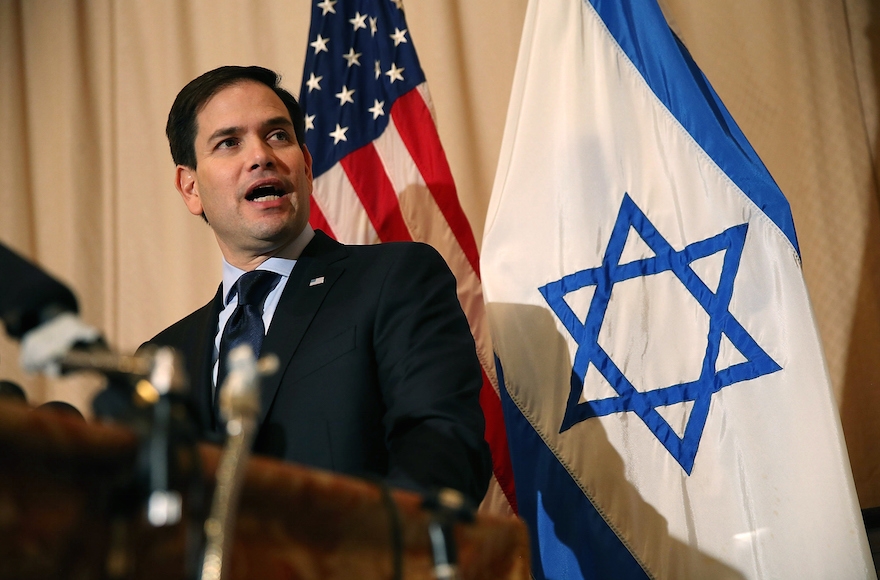Rubio decides to run for reelection, citing intention to kill Iran deal
Published June 23, 2016

Republican presidential candidate Marco Rubio speaking at a press conference at Temple Beth El in West Palm Beach, Fla., March 11, 2016. (Joe Raedle/Getty Images)
WASHINGTON (JTA) — Marco Rubio cited his intention to kill the Iran nuclear deal in his decision to run for reelection to the Senate.
The Florida Republican, first elected in 2010, opted out of running to keep his seat when he announced his candidacy last year for the Republican presidential nomination. He was driven out of that race this year by Donald Trump, who defeated Rubio in his home state primary and who is now the presumptive nominee.
Rubio on Wednesday reversed his decision and said he would run, citing the Iran sanctions relief for nuclear rollback deal, which he had pledged as president to tear up.
“Control of the Senate may very well come down to the race in Florida,” Rubio said in his statement. “That means the future of the Supreme Court will be determined by the Florida Senate seat. It means the future of the disastrous Iran nuclear deal will be determined by the Florida Senate seat. It means the direction of our country’s fiscal and economic policies will be determined by this Senate seat. The stakes for our nation could not be higher.”
Rubio, during his running for president, derided the Senate as do-nothing, a position his opponent is likely to use against him. He acknowledged as much in his statement.
“Have at it,” he wrote. “Because I have never claimed to be perfect, or to have all the answers.”
Major Republican party figures – including Trump who had viciously derided Rubio as “little” and ineffective during the primaries – urged him to run for reelection in the state in a year in which Democrats are expected to perform well, and could well take control of the Senate.
Rubio said he was running in part to keep Trump in check, should he be elected president. Trump has alienated mainstream Republicans with his broadsides against Mexicans and Muslims and his at times crude language. Rubio, after dropping out of the presidential race, endorsed him, but with qualifications.
“The prospect of a Trump presidency is also worrisome to me,” Rubio said in his statement. “It is no secret that I have significant disagreements with Donald Trump. His positions on many key issues are still unknown. And some of his statements, especially about women and minorities, I find not just offensive but unacceptable.”
It is not clear how Rubio believes his vote in the Senate could reverse the Iran deal. The most straightforward American exit from the deal would be through a presidential executive order, which is not dependent on Congress. A congressional bid to kill the deal would require a super-majority of 60 in the Senate, something Republicans are unlikely to secure.
Should Rubio win the GOP primary in August, he will either face Rep. Patrick Murphy or Rep. Alan Grayson, who are in a bitter race for the Democratic nomination. Murphy has the backing of the party establishment, while Grayson, who is Jewish, is running an insurgent campaign from the left based on the campaign of Sen. Bernie Sanders, the Jewish Independent from Vermont who ran a surprisingly tough campaign against Hillary Clinton, now the presumptive Democratic nominee.
The political action committee associated with J Street, the liberal Jewish Middle East policy group, is backing Murphy, and seized upon Rubio’s announcement to fund-raise for their candidate.
“The Senate’s leading neocon is running for another Senate term,” the committee said in an email.
The JStreetPAC email listed Rubio’s transgressions against liberal Jewish orthodoxies, including his pledge to tear up the Iran deal and his harsh criticisms of President Barack Obama, and noted his grudging endorsement of Trump.
“This is the same Marco Rubio who endorsed Donald Trump,” the email said. “Seriously, he endorsed Donald Trump.”














